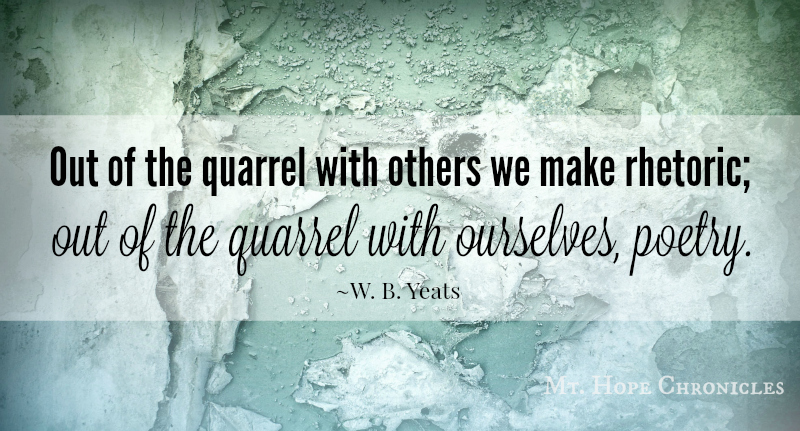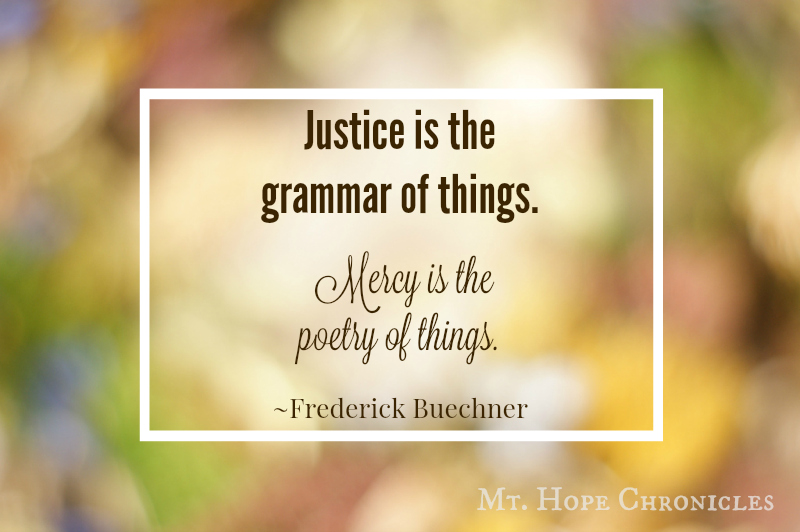
In November, I explored the topic of parallelism here on the blog, and I haven’t stopped thinking about it or finding examples in my reading. The above quote is similar in some ways to the quote I shared in the previous blog post:

I’ve noticed that many of the quotes to which I am drawn employ parallelism in some form. The structure seems to make them more accessible, logical, and memorable. The first word that often comes to my mind is “brilliant!”—so simple and yet incredibly profound. Parallel structure also tends to distill a quote down to the basics and eliminate extraneous or distracting words and ideas. It reinforces the idea that a tight form requires a precision of ideas while counter-intuitively increasing creative thought process (hello, poetry!).
I’ve thought more deeply about these two quotes than almost anything else I’ve read recently.
But not as deeply as I could think about them if I decided to use the 5 Common Topics.
Let’s do that.
Definition
I could spend a whole conversation defining one of these words:
Quarrel
Rhetoric
Poetry
Grammar
Justice
Mercy
[To what broader categories (genus) do these things belong? What are other things (species) in that category? How does each word differ from the other things within the category? What are its parts? Take each word separately, or put them all together. The point is to think about ideas!]
Comparison
[Note: I’ve found a few different versions of the Yeats quote online but here I’ve used the version I found in Greg Wolfe’s book Beauty Will Save the World. For discussion purposes, we’ll use this version specifically.]
How are the two quotes similar in structure? Different?
They both use parallel structure. They are both similar in length. They both contain two independent clauses (the clauses in the first quote are connected by a semicolon, the second quote is expressed in two sentences).
They both use antitheses (contrasting opposite ideas: others/ourselves, rhetoric/poetry and justice/mercy, grammar/poetry).
The first quote uses anaphora (repetition of words at the beginning of phrases, clauses, or sentences: “out of the quarrel”).
The second quote uses epistrophe (repetition of words at the end of phrases, clauses, or sentences: “of things”).
Anaphora and epistrophe are similar (repeating words), and yet opposite (beginning and end).
The first quote contains an action verb (make).
The second quote uses a linking verb (is) to create metaphors.
How are the ideas similar? How are they different?
They both say something about the nature of poetry. The first concerns the origin or impetus of poetry. The second addresses a quality of poetry by use of metaphor?
They both express contrast and relationship of ideas.
[Clearly these questions are more abstract. Answers will vary widely. That’s why I want to sit down and have a conversation over cups of favorite beverages with all of you!!]
Relationship
Both of these quotes are specifically addressing the relationship of things.
How is justice related to mercy?
How is grammar related to poetry?
How is rhetoric related to poetry?
How are we ourselves related to others?
Which came first? Is one dependent upon the other? Does one cause the other?
Circumstance
What was the circumstance or context in which each quote was written?
From the Frederick Buechner Blog:
The following is an excerpt called “Justice” originally published in Whistling in the Dark and later in Beyond Words:
If you break a good law, justice must be invoked not only for goodness' sake but for the good of your own soul. Justice may consist of paying a price for what you've done or simply of the painful knowledge that you deserve to pay a price, which is payment enough. Without one form of justice or the other, the result is ultimately disorder and grief for you and everybody. Thus justice is itself not unmerciful.
Justice also does not preclude mercy. It makes mercy possible. Justice is the pitch of the roof and the structure of the walls. Mercy is the patter of rain on the roof and the life sheltered by the walls. Justice is the grammar of things. Mercy is the poetry of things.
The Cross says something like the same thing on a scale so cosmic and full of mystery that it is hard to grasp. As it represents what one way or another human beings are always doing to each other, the death of that innocent man convicts us as a race and we deserve the grim world that over the centuries we have made for ourselves. As it represents what one way or another we are always doing not so much to God above us somewhere as to God within us and among us everywhere, we deserve the very godlessness we have brought down on our own heads. That is the justice of things.
But the Cross also represents the fact that goodness is present even in grimness and God even in godlessness. That is why it has become the symbol not of our darkest hopelessness but of our brightest hope. That is the mercy of things. Granted who we are, perhaps we could have seen it no other way.According to biographies of William Butler Yeats (and here), he seemed to wrestle at great lengths with his ideas about religion at least, and he was an acclaimed poet. The quote is found in “Anima Hominis.” I won’t claim to understand anything about it, but I found the following excerpt from this analysis fascinating.
In "Anima Hominis," Yeats defines the soul/psyche/mind of the creative individual by means of his Anti-self/double/mask theory and then adds a Daimon element. The focus is on artistic creativity, and how it is served by the tension between self and anti-self: "We make out of the quarrel with others, rhetoric, but out of the quarrel with ourselves, poetry" (331). It is to poets that the other "self" comes--not to "practical men who believe in money": "The other self, the anti-self or the antithetical self, as one may choose to name it comes to those who are no longer deceived, whose passion is reality" [reality, in a Platonic sense] (331). This anti-self is demanding, and accepting its strictures is different from passively accepting the mores of society: "If we cannot imagine ourselves as different from what we are, and try to assume that second self, we cannot impose a discipline upon ourselves... Active virtue, as distinguished from the passive acceptance of a code, is therefore theatrical, consciously dramatic, the wearing of a mask..." (334)What other things were happening or being said about the ideas at the same time?
Authority
What do the authors of the quotes have in common? Differences?
Both men. Both alive in the years 1926-1939. Both acclaimed writers. Both spent time contemplating theological ideas.
Buechner—American novelist and theologian (wrote fiction and non-fiction), Presbyterian minister, born in 1926, still living, finalist for the Pulitzer Prize in 1981.
Yeats—Irish poet, 1865-1939, awarded Nobel Prize for Literature, born into Irish Protestant family but seemed to wrestle at great lengths with his ideas about religion, eventually joining a new group called "The Esoteric Order of the Golden Dawn" which incorporated astrology and traditional European Cabalistic Magic.
Who else has something to say about justice and mercy?
Psalm 103:6,8
The Lord works vindication and justice for all who are oppressed. The Lord is merciful and gracious, slow to anger and abounding in steadfast love.
[ETA] Micah 6:8
He has shown you, O mortal, what is good. And what does the LORD require of you? To act justly and to love mercy and to walk humbly with your God.
Rhetoric and poetry?
Aristotle? The author of both Rhetoric and Poetics.
Rhetoric is “the power of discovering the possible means of persuasion in reference to any subject whatever.”
“Poetry is finer and more philosophical than history; for poetry expresses the universal, and history only the particular.” (More antithesis: poetry/history, universal/particular)Quintilian?
“I hold that no one can be a true orator unless he is also a good man, and, even if he could be, I would not have it so.”Saint Augustine?
“Eloquent speakers give pleasure, wise ones salvation.” (Hello again, antithesis…)N.D. Wilson and Douglas Wilson in The Rhetoric Companion?
“The point of true rhetoric, in all its guises, is to deal with ignorance, bring about like-mindedness, and motivate to action.” (More parallelism.)T. S. Eliot?
“Poetry is not a turning loose of emotion, but an escape from emotion; it is not the expression of personality, but an escape from personality. But, of course, only those who have personality and emotions know what it means to want to escape from these things.”Robert Frost?
“Poetry is when an emotion has found its thought and the thought has found words.”
“A poem begins as a lump in the throat, a sense of wrong, a homesickness, a lovesickness.”[Poets have a lot to say about poetry…]
Who or what is popularly considered an authority and why? Do you agree?

2 comments:
You've made me start off my Monday morning (and my week) with deep and lovely ideas to contemplate. I so appreciate the work you put into modeling and sharing the asking of great questions! Thank you, friend!
So, this has been up on my screen all morning. Just coming back and forth, as we are still on the precipice of 'challenge' thinking. However, we are definitely in the discussion of justice, mercy, right, wrong. The proverbial sign 'You are here.' applies. I've been rumbling through the pages of 'Total Truth'(Pearcy) and discussion the issue of when 'self evident truths' changed to 'its true of you believe it's true.'
Yes, your passages above applied, but because time is fleeting, I'll need to just leave that right there. I'm sure you've already got a spiral filled on this. ;)
Freezing here in GA this a.m. savoring a blissfully cold, fireside morning. Wishing you the same.
Thank you for this post.
Post a Comment